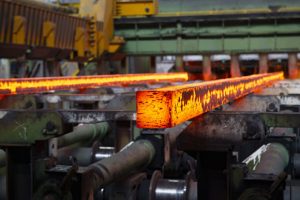This Morning in Metals: Steel capacity utilization rate rises to 81.5%
This morning in metals news: the US steel capacity utilization rate reached 81.5% last week; meanwhile, miner Glencore announced a new liquefied natural gas supply agreement; and, lastly, G7 trade ministers issued a joint communiqué covering market and trade distortions by state enterprises.
Each month, MetalMiner hosts a webinar on a specific metals topic. Explore the upcoming webinars and sign up for each on the MetalMiner Events page.
US steel capacity utilization rate rises to 81.5%
US steel capacity utilization for the week ending May 29 reached 81.5%, the American Iron and Steel Institute (AISI) reported.
Output during the week reached 1,836,000 net tons, AISI reported, up 50.1% year over year. In the previous week, the capacity utilization rate settled at 79.0%.
Meanwhile, the output total marked an increase of 2.4% from the previous week.
For the year to date, production reached 35,913,000 net tons. The capacity utilization rate for the period checked in at 78.1%. Year-to-date output is up 9.5% from the same period in 2020, when the capacity utilization rate reached 69.9%.
Glencore reaches new LNG supply deal
Glencore announced one of its affiliates and NOVATEK Gas & Power Asia Pte. Ltd have signed a supply deal for liquefied natural gas (LNG) from the Arctic LNG 2 project.
“The Agreement establishes the key commercial terms for the long-term supply in excess of 0.5 million tons of LNG per annum,” Glencore said. “The LNG will be delivered to a number of locations in East Asia.”
Aluminum associations on G7 ministers’ communiqué on market distortion
Global aluminum associations reacted positively to a recent joint communiqué from G7 trade ministers on market-distorting subsidies by state enterprises.
“These practices create unfair competitive conditions, hindering the development and use of innovative technologies and undermining the proper functioning of international trade,” the ministers said in the communiqué after the May 28 meeting. “Of particular concern are harmful industrial subsidies, including those that lead to severe excess capacity, a lack of transparency regarding the state’s role in the economy and the role of state enterprises in unfair subsidisation, and forced technology transfer.”
In a statement, the heads of several aluminum associations indicated they welcomed a shift from bilateralism to multilateralism vis-a-vis solving the problem of distortions as they relate to the aluminum market.
“Our member companies are not seeking protection from competition within or outside our countries – we are seeking a global level playing field, with free, fair, and open markets,” the industry group heads said. “Our workers, our companies, our customers, and all of our citizens deserve no less.”
The MetalMiner Best Practice Library offers a wealth of knowledge and tips to help buyers stay on top of metals markets and buying strategies.



Leave a Reply